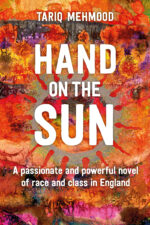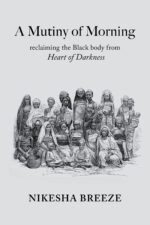- Please choose product options by visiting A Mutiny of Morning: Reclaiming the Black Body from <em>Heart of Darkness</em>.
-
Settler Colonialism
Settler Colonialism examines the genesis in the USA of the first full-fledged settler state in the world, which went beyond its predecessors in 1492. The text originates from Roxanne Dunbar-Ortiz (2021) “Not A Nation of Immigrants: Settler Colonialism, White Supremacy, and a History of Erasure and Exclusion.
-
A Mutiny of Morning: Reclaiming the Black Body from Heart of Darkness
Nikesha Breeze has taken pages from Joseph Conrad’s Heart of Darkness, taken his words, and forced them to leave his colonized mind. She has made the words her own in poetic form. She illuminates the invisible Black voices inside, a radical, surgical, and unapologetic Black appropriation, at the same time as a careful birthing and spiritual road map. The resulting poems are sizzling purifications, violent restorations of integrity, pain, wound, bewilderment, rage, and, sometimes, luminous generosity.
The violent, scathing white supremacy of Joseph Conrad’s Heart of Darkness is traversed page by page and word by word in this brilliant prayer/poem—a work of reclamation, redemption, rescue, and repossession. — Wende Marshall, co-editor Insurrectionary Uprisings: A Reader in Revolutionary Nonviolence and Decolonization
-
Finding a Voice: Asian Women in Britain (New and Expanded Edition)
First published in 1978, and winning the Martin Luther King Memorial Prize for that year, Finding a Voice established a new discourse on South Asian women’s lives and struggles in Britain. Through discussions, interviews and intimate one-to-one conversations with South Asian women, in Urdu, Hindi, Bengali and English, it explored family relationships, the violence of immigration policies, deeply colonial mental health services, militancy at work and also friendship and love. The seventies was a time of some iconic anti-racist and working-class struggles. They are presented here from the point of view of the women who participated in and led them.
This new edition includes a preface by Meena Kandasamy, some historic photographs, and a remarkable new chapter titled ‘In conversation with Finding a Voice: 40 years on’ in which younger South Asian women write about their own lives and struggles weaving them around those portrayed in the book.
An amazing review of the book can be read here: https://librofulltime.wordpress.com/2023/03/03/book-review-amrit-wilson-finding-a-voice-asian-women-in-britain/
Here is an extract:
This book is a call to collective action and sisterhood, a memorial and an instruction to keep going. In her Reflections, Wilson points out White feminists need to let Asian women work on their own problems while standing in support, not intrude and try to sort their issues out for them, and the valuable material she gathers in this book is indeed because she was part of the communities she was studying, speaking to the women in their kitchens in their own languages. I was so pleased to be able to revisit this wonderful work. – Lix Dexter @LyzzyBee_Libro
A great interview with Amrit Wilson in Montreal Serai (October 4, 2020).
‘This book is a wonderful, important and necessary reminder of all the black feminist work behind us and all that is left to do.’ —Sara Ahmed, feminist writer and independent scholar, and author of Living a Feminist Life
‘Finding a Voice acquires a new significance in this neoliberal era…an indispensable archive as well as a narrative of a past that is not past but reactivated and recast…’ —Kumkum Sangari, William F.Vilas Research Professor of English and the Humanities, University of Wisconsin-Milwaukee
‘A ground-breaking book, as relevant today as it was in the seventies – and evidence, if ever such were needed, that the struggles of Asian, African and Caribbean women remain inextricably linked.’ —Stella Dadzie, founder member of OWAAD and author of Heart of the Race
‘Finding a Voice… was affirmation that our lives mattered, that our experiences with all their cultural complexities, mattered.’ —Meera Syal, British comedian, writer, playwright, singer, journalist, producer and actress.
‘This new edition comes at a time…when we are experiencing the growth of the surveillance state and when our narratives are being co-opted and used against us. Finding a Voiceis not only welcome, it is necessary.’ — Marai Larasi, Director, Imkaan; Co-Chair of UK’s End Violence Against Women Coalition.
Amrit Wilson is a writer and activist on issues of race and gender in Britain and South Asian politics. She is a founder member of South Asia Solidarity Group and the Freedom Without Fear Platform, and board member of Imkaan, a Black, South Asian and minority ethnic women’s organisation dedicated to combating violence against women in Britain. She was a founder member of Awaz and an active member of OWAAD. She is author, amongst other books, of Dreams Questions Struggles—South Asian women in Britain (Pluto Press 2006) and The Challenge Road: Women and the Eritrean revolution (Africa World Press 1991). The first edition of Finding a Voice: Asian Women in Britain won the the Martin Luther King Jr award.
It is the impact of oppression, racism and class which unifies South Asian women and the book comes at a time where we see the continued rise of the far right, misogyny, issues of class and the gig economy here and across the globe being played out in the media and perpetuated by male leaders going unchallenged by the state.
These new voices confirm how groundbreaking the book has been as a reference point for south Asian women now through listening to the voices of women from four decades ago, honouring their contribution and speaking in solidarity with them. As Wilson says in her introduction, it “reclaims our collective past as an act of resistance.”
An excellent read.
‘Reclaiming our collective past’: Amrit Wilson reflects on 40 years of anti-racist feminist work
By Sophia Siddiqui ARCHIVESPOLITICS 30th October 2018
http://gal-dem.com/collective-past-amrit-wilson-reflects-anti-racist-feminist-work/?fbclid=IwAR2qF13MA82F-9hztnRg4hN8ry5EEiZ2rYUtzX4OPuG7CELOzffhCTBjm4o




